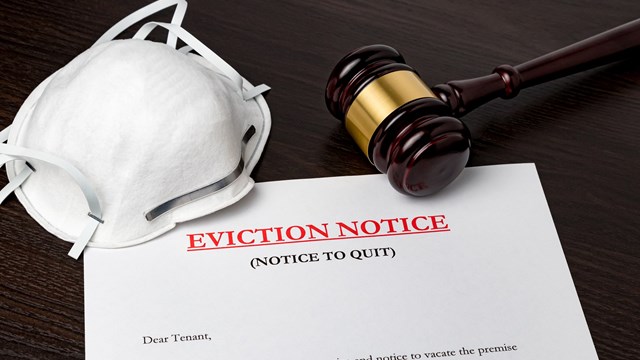
Wait a second. You say you bought your apartment, but you don’t own it? Huh?”
Explain the concept of the cooperative apartment —you buy shares of a corporation and then rent the apartment to yourself—to a homeowner outside of New York City, and you can’t blame them if they look at you like you’re crazy.
But this crazy form of apartment ownership, by far the most prevalent in New York City, is one reason co-ops have largely escaped the disaster that has befallen so many condo associations across the country over the last few years: the avalanche of owners falling into delinquency and default.
Because of the greater power co-op corporation boards have in qualifying—and disqualifying—potential buyers, “they really delve into the finances and employment” of people seeking to buy into their community, notes Steven Chase, partner with Kramer & Shapiro in Kew Gardens, Queens. And boards are typically quick to ban investors and curtail sublets.
But while the number of co-op shareholders falling into arrears on their monthly maintenance hasn’t risen substantially, despite the economic downturn, the problem has not gone away—people lose jobs, face medical emergencies, divorce and die in any economy—and its effects are more damaging to the corporation today.
With the severe slowdown in resale activity since the real estate crash, income from flip taxes has dropped at the same time property taxes and fuel prices are soaring. As a result, operating budgets for many building are tighter than they have been in decades and collecting on arrears is more important than ever.
Staying on Top of Arrears
To prevent delinquencies from getting out of control, “We advise boards and managers that they really need to stay on top of the arrears,” says Gregory M. Dyer, a partner with the law firm of McCarter & English, in Newark, New Jersey. “If somebody’s falling behind, you need to take action quickly.”
“The property management and board should do an arrears report monthly to see who’s in arrears and by how much,” advises Chase. And act immediately—not next month. If the arrearage becomes huge, it is more difficult to manage, he adds.
Most buildings automatically issue penalties on past due maintenance payments, from $35 to as high as $100. They usually begin after the 10th or 15th of the month the payment is due.
But while the board should definitely, as a matter of policy, levy a late fee on past due maintenance, they should not expect miracles: “I find that they are not a very huge deterrent,” says Chase. “If somebody doesn’t have the money, a five-percent fine doesn’t normally change their behavior.”
Management should send a collection notice to an owner who is behind in their maintenance by more than a month, making sure the letter follows the dictates of the federal Fair Debt Collection Practices Act. The act applies to any third-party agent that collects a debt for a client, requiring that they disclose a range of specific information about the debt and the rights of the debtor to dispute the claim. As the primary party, the corporation itself can ignore the act, but, says Dyer, “to be safe, we advise management companies to comply if they are going to be sending collection-type letters to the unit owners.”
The manager should follow up with a phone call. According to attorney David Rosenberg of the Manhattan-based law firm Marcus Rosenberg & Diamond LLP, “Whenever we get a request from the managing agent or the board to start a legal proceeding, we ask if we can make a phone call first. Theoretically, the management should do that, but sometimes when we make the call [the shareholder in arrears] say they haven’t heard from anybody.”
Indeed, adds Rosenberg, the board “might get deep into litigation and then realize it really could’ve been resolved with a phone call. Nobody’s happy about that. You waste time and run up fees. And if it turns out that it really wasn’t the shareholder’s fault, then the co-op has to eat the expense.”
Set Up a Payment Plan
In the course of getting more information about an arrears situation, a manager may find that the delinquent shareholder has lost their job or faces a medical condition, but is amenable to setting up a payment plan.
The payment plan can offer incentives to the shareholder for compliance. For example, the shareholder could agree to pay current maintenance charges when they’re due, along with a portion of the arrears with each payment. Late fees accrue steadily, but if the owner sticks to the payment schedule, once the arrears are paid off, the late fees are waived. If he or she doesn’t pay off the debt, the accrued late fees stand and the case goes to court.
“In the cases where we’ve spoken to the shareholder and worked out a payment plan,” says Chase, “eight or nine times out of 10 it does work out. And in the cases where it didn’t work out and we’ve had to pursue legal action, the shareholder agrees to sell the apartment and we collect the arrears at the closing of the sale.”
A phone call to check on arrears might also reveal “instances where people are becoming elderly and just forget to send in a check,” says Chase. “Sometimes getting in touch with their adult child or family member can remedy that.”
Rosenberg recommends the board closely follow the progress of each case with the manager: “It’s not unusual to find that the co-op’s managing agent has a dispute with the shareholder as to the amount that is owed and it doesn’t get communicated to the board—and sometimes the shareholders is right and the managing agent is wrong.”
“We try to get to the root of it,” adds Rosenberg. “If the shareholder says their records are wrong, ‘I’ll send you the checks.’ We say ‘fine, do that.’” Or if they say they want to pay the arrears but need more time, he says, “We put it to the board and tell them about their situation. Some boards will give some grace. You are not allowed to forgive charges or maintenance because you have to treat everybody equally, but you can spread out the pain of the arrears.”
In some cases, says Rosenberg, “you might go into an agreement with a shareholder that says either you clean up your arrears or the unit will be sold by you—and if not by you, after a period of time, by us. You write in timelines.”
Take It to the Bank
If attempts to negotiate a settlement on arrears seem to be going nowhere and the owner has a mortgage on the unit, “I would strongly suggest the board notifies the bank,” advises attorney Martin Tenenbaum, a partner in the Brooklyn-based law firm Tenenbaum Berger & Shivers LLP. “Banks do not want you to be in default of your maintenance payments.”
Co-ops have a “statutory lien” on a shareholder’s property, which means they must be paid all arrears by the bank in the event of a default, and they must be paid first if the owner sells the property.
“The bank will put additional pressure on the person to pay,” adds Tenenbaum, “and, should the shareholder fail to pay, in order to protect their interest they might come in and pay the maintenance—to satisfy the outstanding arrears—so if they foreclose, they can get clear title.”
Going Legal on Their Asset
At the end of two or three months of non-payment of maintenance, if no payment plan has been negotiated, management should turn the case over to the co-op’s attorney. The attorney will normally commence a summary proceeding to recover unpaid maintenance. In other words, they will sue the shareholder for breaking the proprietary lease, which requires maintenance be paid monthly. Because cooperative corporations are in effect landlords from which shareholders rent apartments, the case goes to the landlord-tenant part of the housing court.
After it begins the summary proceeding, the co-op serves a notice of petition. If the shareholder answers the petition, the court assigns a date for a hearing. Ideally the court hearing leads to an agreement to enter a structured payment plan, called a stipulation. If the shareholder ignores the late letters and court summons, the co-op will apply for a default judgment and get a warrant of eviction. The shareholder has 10 days to respond to an eviction notice. Once they do, the court date is usually a week later.
As landlords, co-op boards have a strong position in relation to shareholders and will likely win a judgment for arrears. If the shareholder does not pay the judgment, the co-op has the right to evict and take possession of the apartment. All in all, it’s not uncommon for a judgment to take six to eight months.
Collection for Condos
Condominiums have a much harder time of it. They have no right to evict the owner and no landlord/tenant court in which to bring a case.
According to attorney Lisa Breier Urban, a partner with the Breier Deutschmeister Urban Popper Law Group PLLC, based in Manhattan, “If there is a foreclosure pending from the bank, the condo has very little they can do to recoup the outstanding common charges. The only way they can get the outstanding common charges is if the bank sells the apartment and the sale is for more than the mortgage amount,” which is hardly the case with condominiums bought during the real estate boom.
The more common tactic is for the association to pursue a money judgment from the owner personally—sue for breach of their contract with the association, which, according to the bylaws, stipulates that he or she agrees to pay monthly dues to the corporation.
“You can wind up with a money judgment against the unit owner that you can execute,” says Dyer. And then you can “go after their wages or other assets and bank accounts, seize property or garnish their wages.” If the suit goes in the association’s favor, the judgment is enforced by a marshal or sheriff, who is entitled, among other things, to confiscate the debtor’s property and sell it at an auction and use the proceeds to pay off the judgment.
Whether serving a co-op or condo, a common mistake boards make, observes Urban, “is letting arrears pile up. Especially in smaller buildings, if you have just one unit owner who is not paying, it’s going to affect everybody because you are not collecting everything you have budgeted to collect. It can hurt no matter if it’s one or half a dozen.”
Steven Cutler is a freelance writer and a frequent contributor to The Cooperator.






Leave a Comment